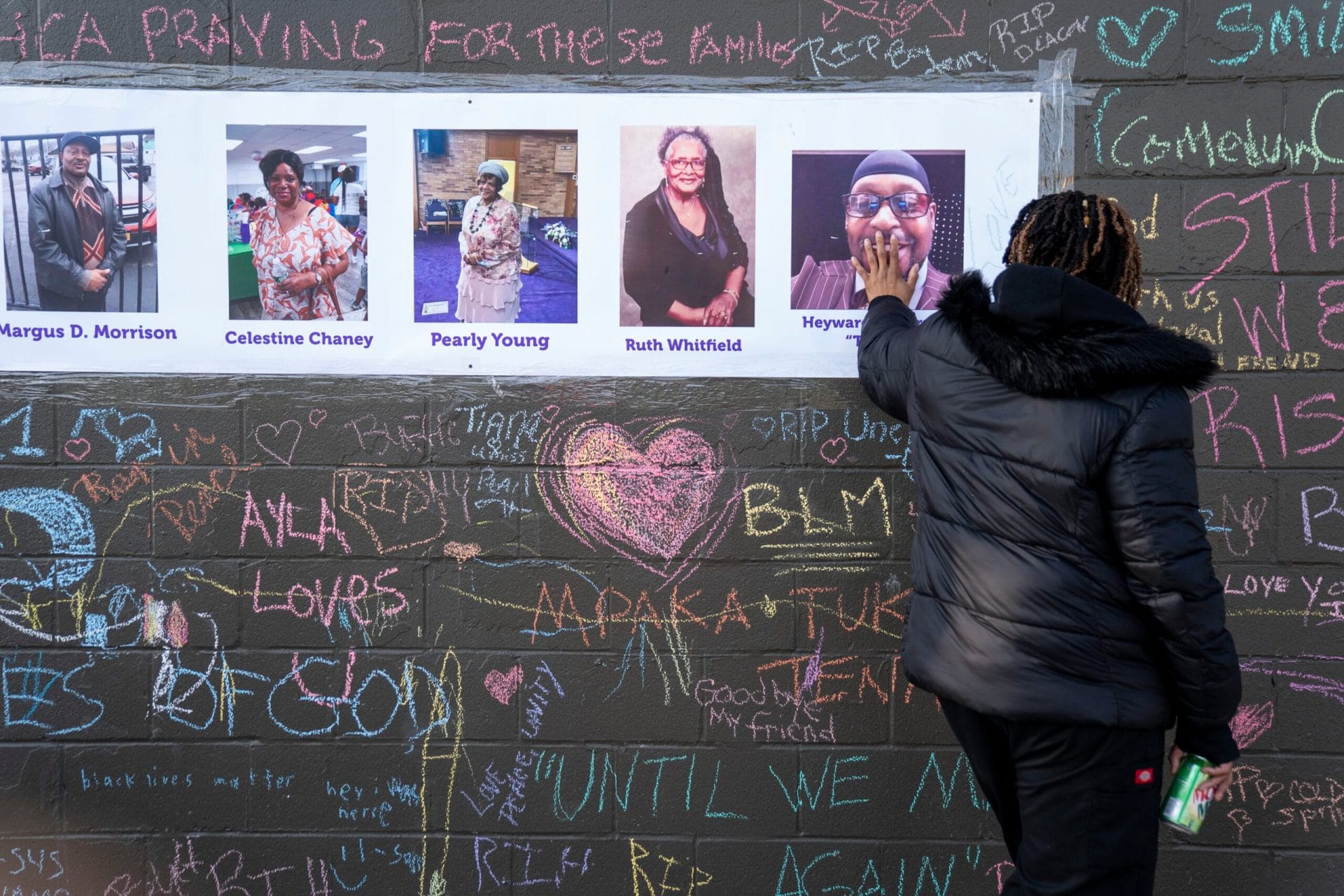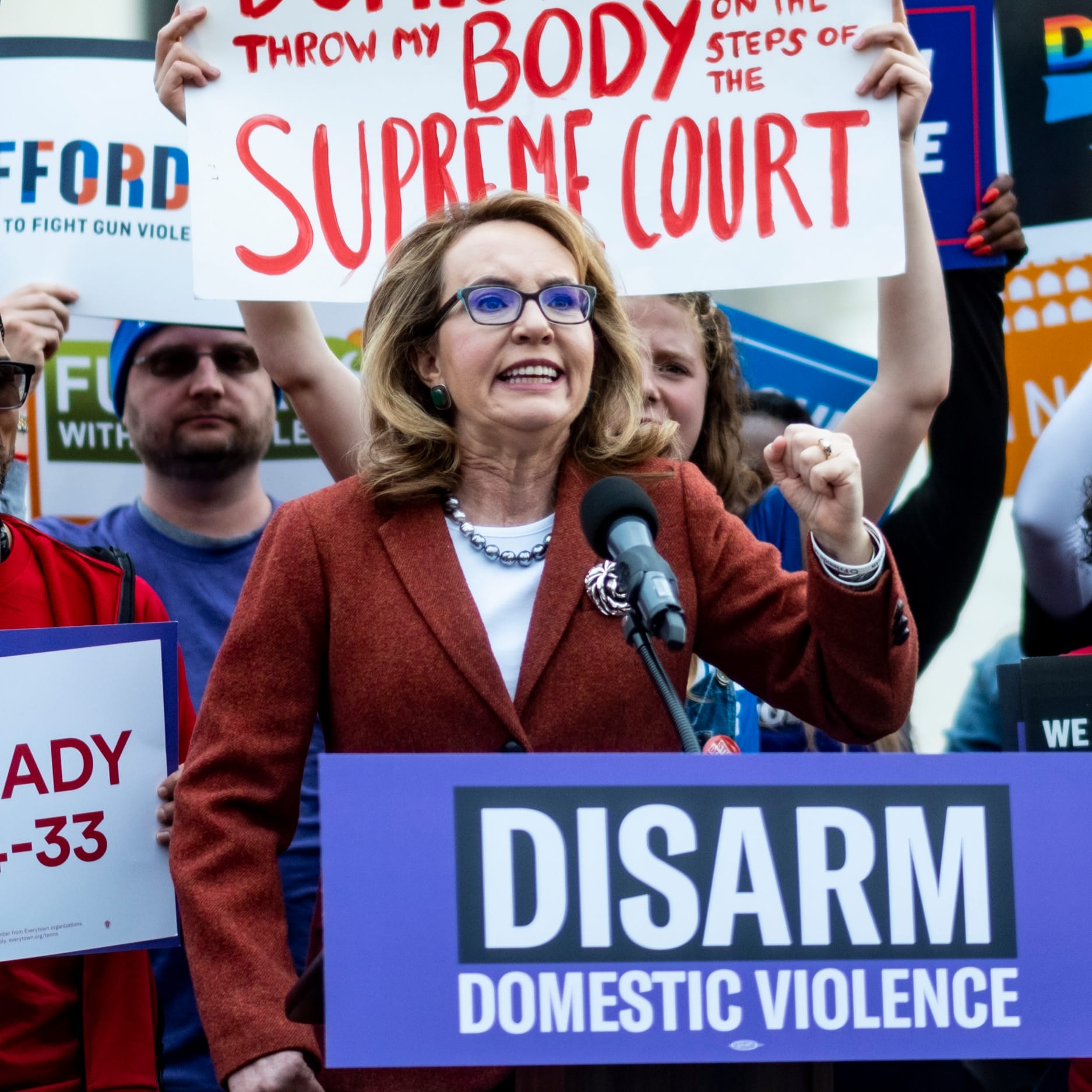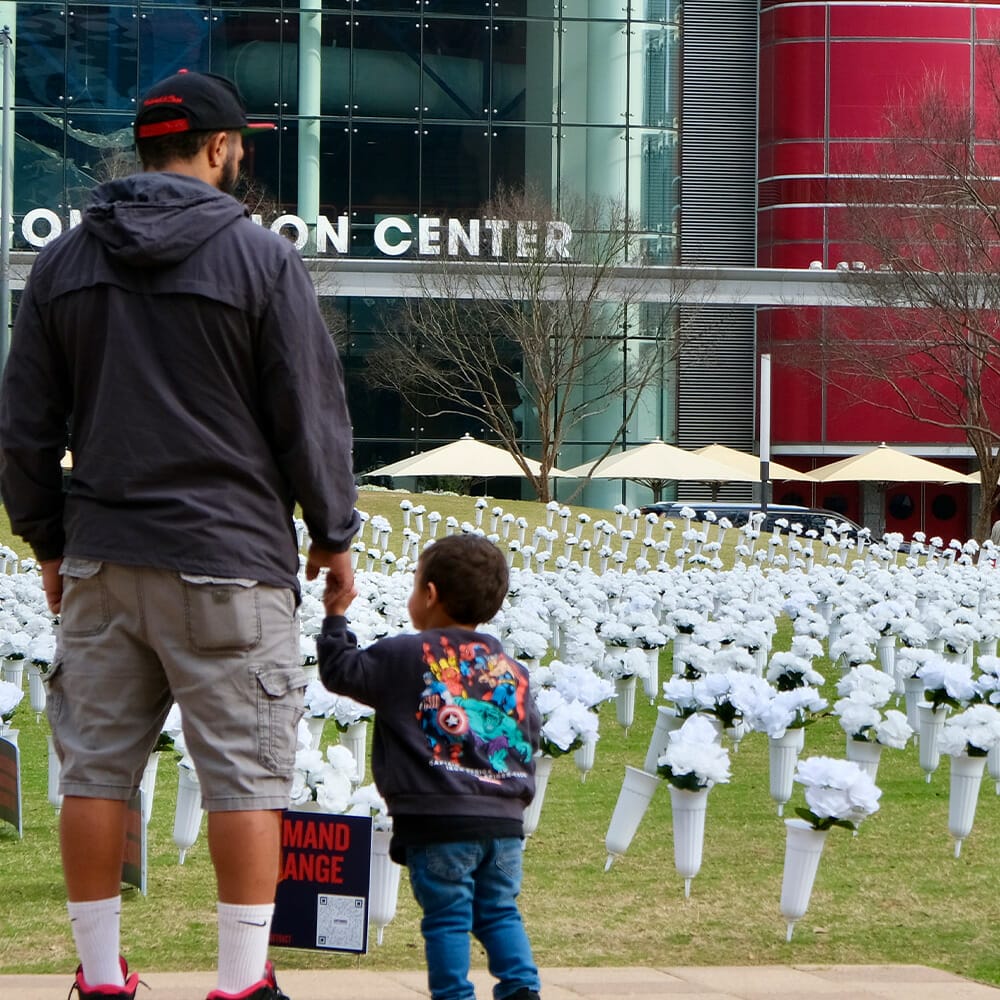
Our Lawsuit in Buffalo: Why We’re Suing Social Media and Gun Companies
On May 14, 2022, an 18-year-old white supremacist radicalized on social media drove hundreds of miles to commit a racist hate crime in Buffalo, New York.
He targeted Tops Friendly Markets, a supermarket on the East Side of Buffalo, because it was in a historically Black neighborhood. He spent months meticulously planning his massacre, visiting the store multiple times, mapping its layout, and researching a murder weapon that would facilitate his appalling goal—killing as many Black people as possible.
At 2:08 pm on the day of the shooting, the gunman began live streaming on Twitch. The stream showed him driving to the store with a bolt-action rifle in the passenger seat and a ballistic helmet on his head, camera attached and visible in the rearview mirror. He wore body armor manufactured by RMA Armament, and in addition to the bolt-action rifle, he brought a Bushmaster XM15-E2S AR-15–style rifle, a 12-gauge shotgun, and multiple magazines.
Just before 2:30 pm, after he had been live streaming for about 22 minutes—and knowing that others were watching him on Twitch—the soon-to-be shooter got out of his car, walked toward the store, and began firing at whoever he saw. In just two minutes, he murdered 10 people, all Black, and injured three others, their lives forever changed. Before Twitch finally shut the stream down, the recording of the attack had spread across the internet, where it received millions of views.
GIFFORDS Law Center, the Law Office of John V. Elmore, and the Social Media Victims Law Center filed a lawsuit together against a number of social media and gun companies for their role in the shooting. We represent one survivor of the atrocious attack, Latisha Rogers, who was working customer service at the store, and the families of three victims:
- Andre Mackneil, 51, who was at Tops that day to purchase a cake for his three-year-old son’s birthday party.
- Katherine “Kat” Massey, 72, a community activist and retired teacher.
- Heyward Patterson, 67, a deacon at State Tabernacle Church of God and retired security guard.
We filed our lawsuit on the first anniversary of the shooting and named social media companies, including Meta Platforms (Facebook and Instagram), Snap (Snapchat), Alphabet (YouTube and Google), Discord, Reddit, Amazon (Twitch), and 4chan, as partly responsible for this mass shooting, along with three firearm companies that armed the shooter with an illegal assault weapon and military-style body armor.
MEDIA REQUESTS
Our experts can speak to the full spectrum of gun violence prevention issues. Have a question? Email us at media@giffords.org.
Contact
Our lawsuit lays out how the social media companies negligently, defectively, and harmfully designed their products, like Facebook, Instagram, and Reddit, to recommend racist, antisemitic, and white supremacist propaganda to users like the Tops shooter.
The Tops shooter acknowledged that the heinous material social media products fed him contributed to his radicalization. In the shooter’s own words, he was driven to massacre Black people by the concept of “white replacement theory.” The social media companies that helped motivate him share no small part of the blame for the tragedy in Buffalo—his radicalization on social media wasn’t a coincidence and it wasn’t an accident. It was the foreseeable consequence of these companies’ intentional design, programming, and distribution of their products, to maximize user engagement (and corresponding advertising revenue) at the expense of public safety.
The longer a user stays on a social media product, the more ads they’re shown, and the more ad revenue the product generates for its parent company. By continually feeding users content they can’t look away from, no matter how extreme or dangerous, the companies are able to keep users on their sites and increase their profits.
Social media companies ultimately drew the Tops shooter down a rabbit hole of increasingly racist and antisemitic content, a radicalization process that began when he was just a teenager. His decision to open fire on innocent shoppers wasn’t made on a whim—the gunman was radicalized by the racist, antisemitic, and white supremacist propaganda social media products pushed his way.
Our lawsuit also includes claims against the gun industry. Vintage Firearms, a store in Endicott, New York, improperly sold the Tops shooter the Bushmaster assault weapon used in the massacre. MEAN Arms, a manufacturer in Woodstock, Georgia, made an easily removable lock that allowed him to install large-capacity magazines. And RMA Armament, an Iowa-based body armor company, improperly sold him the military-style body armor that protected him during the massacre.
All of the social media companies and two of the firearm companies (Vintage Firearms and MEAN Arms) moved to dismiss our lawsuit. In a series of pretrial victories, a judge on the Erie County Supreme Court ruled that our lawsuit can proceed against each and every defendant, denying all the motions to dismiss.
These were significant wins, because the judge rejected claims of immunity from both the firearm and the social media defendants. The firearm defendants tried to hide behind the Protection of Lawful Commerce in Arms Act , while the social media companies argued they were immune from civil liability due to Section 230 of the Communications Decency Act. The judge determined that neither federal statute prevented the lawsuits from moving forward to the next phase—the investigation phase—allowing us to get one step closer to justice.
This was a crucial victory for our clients, but the fight continues—the defendants have already appealed the decision from the Erie County Supreme Court to New York’s intermediate appellate court, asking them to reverse the favorable rulings we received.
Live streaming his mass murder on Twitch was a critical component of the Tops shooter’s plan. He was exposed to—and even studied—other racist murderers’ social media posts. He used social media to plan his attack, to select his guns and body armor, and to train himself on how to access the store. He previously acknowledged this in his diary: “Knowing that so many other attackers like myself are out there rooting for me gives me quite a bit of confidence… Yes I do find inspiration from other attackers.” As he arrived in the Tops parking lot, he said aloud to his streaming audience, “I just gotta go for it right? It’s the end, right here, I’m going in.”
As we seek accountability for our clients in Buffalo, we know that the Tops shooter is just one name on the ever-growing list of hate crime mass shooters across the country, whose attacks are made much more lethal by the use of guns. And he’s not the only gunman whose bias-fueled violence has been catalyzed by social media.
Social media companies clearly understand the revenue and growth potential presented by young users like the Tops shooter, as well as their vulnerabilities. They have purposely and methodically exploited vulnerabilities in adolescent and young adult psychology to addict children, teenagers, and young adults and maximize users’ time and engagement—as Facebook’s first president has acknowledged. We’ve witnessed this exploitation culminate in mass shootings many times by now, including at a gaming tournament in Jacksonville and an outlet mall in Texas, as well as, of course, Tops Markets in Buffalo—and there’s no sign that it will stop.
Because social media companies are focused on making as much money as possible, they often make decisions at the expense of public safety—just like the gun industry. For the families of the victims, and for so many others, social media companies must not design their products to prioritize profits over community safety. They must be held accountable for the real-world harm they have already caused and change their products to avoid contributing to future atrocities.

LItigation
the courts
Explore our work defending lifesaving gun laws in the courts and fighting to debunk the gun lobby’s dangerous arguments about the Second Amendment.


Social Media Products Facilitate Mass Shootings